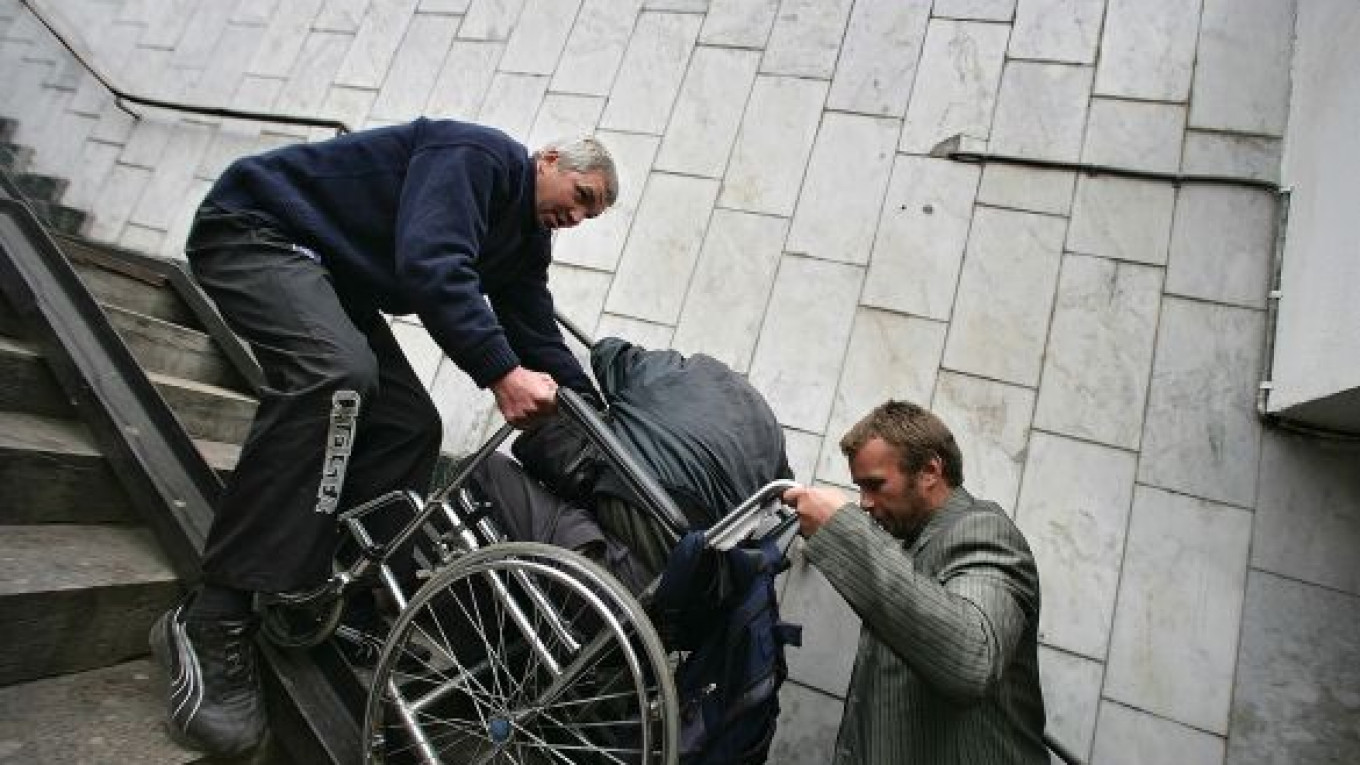In January, billboard advertising appeared on the streets of Moscow showing the resumés of disabled people. The new ad campaign is the continuation of the "Everyone is different. Everyone is equal" program, which was started last summer by the TV channel Dozhd to publicize the employment of people with disabilities. Since August, the channel has been running clips featuring disabled people who have found their way in life.
"I talk a lot with people with disabilities and know about their problems firsthand. Employment is one of the main ones," said TV journalist Yevgenia Voskoboinikova, who initiated the program and has been in a wheelchair for six years following an accident.
"For now, the Russian mentality often regards people with disabilities as people living on welfare and begging in underpasses, not as people working and earning a living with their intelligence and skills," Voskoboinikova added. "We want to change this perception, as well as give people with disabilities a place to display their resumés."
Experts said helping disabled people find employment on the open job market is more economically effective and advantageous for the government than creating special enterprises to employ such workers, as was done in the Soviet period. Agencies at different levels of government have agreed. Nonetheless, not everyone agrees that the situation has gotten better for disabled job-seekers.
Not Getting Better
"For a person from the first group, it's not getting better," said Oleg Golubov, referring to the classification that includes the most serious disabilities. Golubov, who uploaded his resume to the Dozhd website as part of the "Everyone is equal" program, hasn't been able to find work after an extensive search.
Marina Galasyuk, a senior employee at retail bank Renaissance Capital who is also disabled, agreed with Golubov's assessment.
"For now, it's not getting easier to find work," Galasyuk said.
Galasyuk was able to get a job at the bank by making it to the finals of the "Path to a Career" competition for students with disabilities, which the Perspektiva Regional Civic Organization of Disabled People has been holding since 2008 with support from the Business Council on Disability Issues.
"Before [the competition], I was only able to find temporary work from home," Galasyuk said.
On several occasions, employers liked her resumé and invited her for an interview, only to turn her away after they learned that she moves about in a wheelchair, Galasyuk said.
Voskoboinikova said the situation has been changing over the past two or three years, however. Companies are more willing to hire people with disabilities, she said, and many, such as Transaero and Nike, now regard this as an aspect of social responsibility.
"To hire a person with a disability doesn't mean you have to suffer some sort of damages," Voskoboinikova said. "I know from my own experience that this person will stick to his work and give his all, no less than anyone else. The problem is more likely one of accessibility, which can be solved."
Currently, any company with documents to show it has hired a disabled person can receive 50,000 rubles ($1,700) for equipment to make its workplace accessible, Voskoboinikova said.
Informational support is not enough to promote the employment of disabled people, said Mikhail Novikov, director of employment programs for disabled people at Perspektiva.
"We need a serious process of guiding that person on the job market, consultations with the employer, the creation of conditions for including that person in the staff at the place of employment," Novikov said.
Engaging Employers
According to Novikov, the attitude of government structures toward disabled people is definitely changing.
Last spring, the Health and Social Development Ministry became one of the initiators of a round-table discussion on employment for people with disabilities, which featured the participation of members of Perspektiva and businesses with experience employing disabled people.
Last year also marked the start of a five-year program called "Accessible Environment," which for the first time separately mandates support for civic organizations promoting employment for disabled people, according to Grigory Lekarev, director of the department for disability issues at the ministry. The program mandates support not only for the creation of specialized jobs and the installation of accessibility measures, but also for the employment of disabled people on the open job market, Lekarev said.
In particular, the ministry, besides financing the creation of new jobs for people with disabilities, has since 2011 started to support civic organizations that promote the employment of disabled people on the open market, he said.
"And for us, it's been very nice to receive that financing. It's important," Novikov said. "Employment on the open job market is in fact more economically effective and advantageous for the government than the creation of specialized enterprises."
Perspektiva has been active in fulfilling the function of a mediator between businesses and disabled people who need work: In 2011, the organization found employment on the open market for about 150 people.
On the same day Novikov spoke with Vedomosti, Perspektiva had given a presentation at UralSib, he said. The organization also works with Citibank, Clifford Chance, Coleman Services, DPD in Russia, Ernst & Young, KPMG in Russia, Microsoft, Naim.ru, Nike, Sodexo and Transaero. The list of partners is gradually expanding, he added.
"We're saying that businesses shouldn't think of this as charity, but rather as a new opportunity on the job market, as an opportunity to acquire new qualified and dedicated employees," Novikov said. "And those who have already hired employees with disabilities and have seen the efficacy of their work share our position."
Slow But Steady
Disabled candidates are gradually making headway at many workplaces.
"At Nike, people with disabilities can participate in the competition for any position that corresponds to their professional skills and expectations, under the same conditions as everyone else," said Sophia Chernova, manager for staff recruitment and development at Nike.
Each year, students with disabilities take part in the company's summer internship assessments and often win positions, she added.
Currently, four employees with disabilities work at the company DPD. Two developed their disabilities as the result of illnesses that occurred when they were already working at the company. The other two were hired through Perspektiva, one in the position of legal assistant and one as client services coordinator.
"None of the employees hired through Perspektiva had any difficulties adapting as part of the staff, but at the beginning there wasn't an understanding of why the company should hire people with disabilities when there were plenty of completely healthy candidates around," said Yelena Arefyeva, HR director of DPD in Russia. "A whole range of stereotypes caused problems."
DPD was prepared to fight these stereotypes, however. In the main hall of the office, the company organized a photography exhibit titled "Life in Full Color" that showed the personal lives, successes and accomplishments of people with disabilities. Meanwhile, Perspektiva held a two-day training for managers and employees dedicated to the various aspects (including legal aspects) of employing disabled people. Employees also enjoyed a film festival called "Cinema Without Barriers," which showed movies depicting disabilities, filmed by disabled people.
The two new disabled employees, both of whom have cerebral palsy, have now been working at the company for two years. Both are sociable and get along well with colleagues, and one was recently promoted from legal assistant to legal advisor, Arafyeva said.
An Extra Resource
For Nike, employing people with disabilities is both a social mission and an effective way to attract and utilize manpower, Arefyeva said.
"These candidates are an extra resource on the job market that still hasn't been seized upon by recruiters, one that features the qualifications and professionalism to contend for vacant positions on a competitive basis," she said.
However, not everyone is convinced that employment problems are lessening for disabled people.
"In my opinion, nothing new is happening at the moment," said Yevgeny Papoport, director of the charity project Avoska Darit Nadezhdu, which employees several dozen people with disabilities. "In Moscow, even people from the third group [least hampered by disability] don't seek work very eagerly, because they don't want to lose their big Moscuvite disability benefits. And the problem of inclusion is still very acute."
Nevertheless, this situation will change, Voskoboinikova said.
"When a person is sitting at home, living on a stipend of 8,000 rubles ($266) [a month], and sees that another person in a wheelchair is going to work everyday, is making several times more and is personally content, there arises a motivation to change his life," she said. "The problem isn't that these people don't want to work. They're afraid that they won't be understood, that they won't be accepted into the team, that it will be hard for them to get to work."
For now, the employment prospects of disabled people are improving only in Moscow, but in two to three years change will come to the regions, as well, Voskoboinikova said.
According to Novikov, Perspektiva will begin operations in the regions in 2012 with the support of the Health and Social Development Ministry.
In some regions, provisions have already been made for employment of disabled people. For instance, the Park Inn by Radisson Polyarniye Zori hotel in Murmansk employs four employees with disabilities, as is required by a quota set by the Murmansk region, said the hotel's manager Eivind Dalvang. The employees work as a translator, floor supervisor's assistant, senior supervising manager and support services staff member.
"They are very pleasant, responsible and friendly employees, and of course, it's important that they have an opportunity for professional and social rehabilitation," Dalvang said.
A Message from The Moscow Times:
Dear readers,
We are facing unprecedented challenges. Russia's Prosecutor General's Office has designated The Moscow Times as an "undesirable" organization, criminalizing our work and putting our staff at risk of prosecution. This follows our earlier unjust labeling as a "foreign agent."
These actions are direct attempts to silence independent journalism in Russia. The authorities claim our work "discredits the decisions of the Russian leadership." We see things differently: we strive to provide accurate, unbiased reporting on Russia.
We, the journalists of The Moscow Times, refuse to be silenced. But to continue our work, we need your help.
Your support, no matter how small, makes a world of difference. If you can, please support us monthly starting from just $2. It's quick to set up, and every contribution makes a significant impact.
By supporting The Moscow Times, you're defending open, independent journalism in the face of repression. Thank you for standing with us.
Remind me later.






